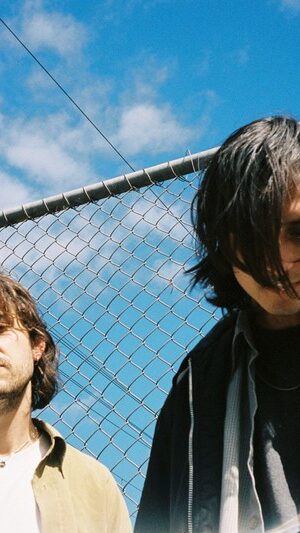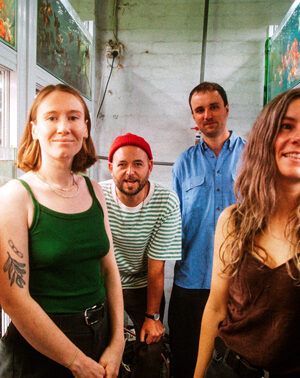TMR TALKS TO...
REBECKA REINHARD
In this interview feature, we get to know the most radicalist up and coming stars on the planet.
This time we’re chatting to Rebecka Reinhard as she gears up to release her long-awaited Whale EP.
A Stockholm native who made her way to London via Paris, Reinhard’s music has been developing for a number of years. Since she began recording with Anders Källmark in the summer of 2018, she has dropped a string of beautiful dream-pop offerings that twist and turn in aesthetic and style, much like the rest of her EP. Her style is very much embracing of the subtleties of dreamy, minimalistic pop music, but isn’t afraid to hit us with moments that turn everything on its head- something her bassist has termed ‘The Reinhard Manoeuvre’. Her influences are vast and numerous, but names like Angel Olsen and Sharon Van Etten have been linked to her sound.
We caught up with Rebecka just before the release date of Whale, and discussed everything from COVID to the story behind her most recent tunes.
***
TMR: What was it that made you get into music in the first place?
If only I knew what that was so that I could build a time machine, go back and find a way to get OUT of music. It has always just been there. It isn’t something I choose to do because it’s a fun way to pass the time, quite the opposite. But it just wouldn’t work otherwise. I think my head would slowly implode if I stopped.
TMR: How do you achieve that atmospheric, distant sound on tracks like ‘No Release’ and ‘A Pick’?
My main instrument is guitar and it’s always my go-to tool when I want to build texture and space on a track. Having several layers with different sounds, some super clean and others heavily distorted and with varying amounts of reverb and delay is probably my favourite way to create that. When recording drums for the EP we also took an afternoon to send loads of vocals, synths and guitars through the massive echo plates they have at RAK studios which has the most lush, organic quality to it. If I ever get a big house in the country I’d want to install echo plates in the basement. They cost about an arm and a leg but it’d be worth it.
TMR: Is the poetic story of ‘Stamford Hill’ based on real events?
Well, that depends on your definition of real. I don’t necessarily believe in the traditional distinction between fiction and reality when it comes to art. And I especially dislike the current trend of uplifting 'true stories' as inherently holding a higher artistic value. That being said, was I once on a bus rolling through Stamford Hill in north London on my way to see a new lover? And did a specific song come on in my headphones that pierced my heart like a tiny dagger because it made me think of my ex? Did I start crying, yet again, and after getting off at the bus stop did I try to dry the tears while walking past the big warehouse with all its blinking lights and carefree people? Did my lover have a broken bed, did they talk about their work and if yes - does this make it a better song?
TMR: Where does your love for complexity come from? The textural jumps of ‘Whale’ and the metric changes of ‘A Pick’, for example?
If there is a common denominator for me when it comes to music I truly love, it’s a sense of tension. It can be big or small, something slow and steady or intense and chaotic. But it’s that special energy that exists between two (or several) opposing forces. If things are too harmonious and slick, I lose interest. A song can be beautiful and well-produced but if there is nothing working against that, maybe just one jarring note or a weirdly syncopated beat or a voice that you’re not sure if it will hold or break, then it just doesn’t do it for me.
TMR: What made you create such an eclectic EP with so much contrast?
I’ve always consumed and written music that stretches over multiple genres. This is just the first time I’ve had the means to allow that diversity to come together. Most of these songs were written around the same time and even if they sound quite different, they have a streak of the same underlying emotional state I was in when I wrote them. It just manifests itself in different ways. I don’t know if it’s a Pisces thing but I’ve always felt like I need various creative outlets. Like each side of me has its own distinct expression. I feel the same way about languages and I had this powerful urge to learn French when I was a teenager so I moved to Paris and threw myself into it. And for some strange reason I felt like there was a part of my personality that finally got to come out, that had been there all along. It was a similar feeling when I moved to London, got my backing band together and finally got to arrange these loud and messy songs. They had just been waiting to come out, each one representing a specific piece of me and therefor sounding different from each other.
TMR: You say yourself that many of your tracks combine downbeat lyrics with uplifting melodies. What makes you look for juxtaposition, rather than going fully one way or another?
I guess this goes back to my love for that musical tension created by juxtaposition that I talked about earlier. I am also a sucker for the open-ended and ambiguous. There has to be room for interpretation and multiple feelings. If things are too obvious I immediately shy away. Like if I listen to a song and get the feeling that "Wait a minute, someone has already decided how I’m supposed to react to this" then you’ve lost me. Maybe it comes from my loathing for when people try to tell me what to do.
TMR: Do you view Whale as a collection of unordered songs, or a complete work intended to be consumed all at once?
As a lover of the somewhat lost art of album-making I want to suggest that Whale should be viewed as an entity in its own right, and consumed as such. Because of the diverse nature of the songs however, it’s not really something to just have on in the background to create a consistent atmosphere. All six songs demand a fair bit of attention. I sometimes think of them as my moody teenage kids, each one wrapped up in their own melodramatic narrative, feeling misunderstood and alone but with an urgent desire to express themselves to the indifferent and stagnant world. So maybe one should take it in small doses really…
TMR: Are you influenced by anything non-musical when writing?
Hard to tell. I guess so. But it’s hard to know what comes from what, which thoughts and impressions that merge into a song. I sometimes think "Oh, I should turn this into lyrics" but whenever I try to consciously capture an idea or situation it just turns to nothing. I have a feeling that my songs sneak up on me rather than the other way around. Like some unusual bird that only shows itself if you sit still for hours and hold your breath.
TMR: Has lockdown changed the way you approach music?
No, at least not in any major sense. I miss band practice and gigs terribly though. I’m one of those rare musicians that actually love seeing other bands play live and I go to tons of gigs so this year’s lack of live music consumption might have an impact on my future writing. Too soon to tell. It might cause a draught or it might do wonders. I’m hoping for the latter.
TMR: How do you envision the music industry in a post-COVID world?
I envision an industry where the people who aren’t in it for the money are the ones getting paid.
***
-Dan Peeke




